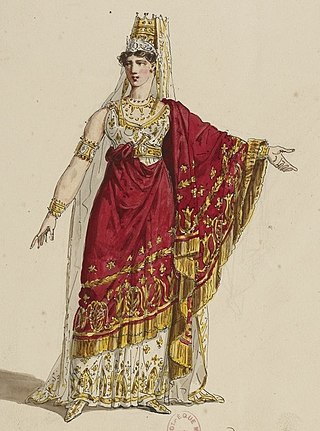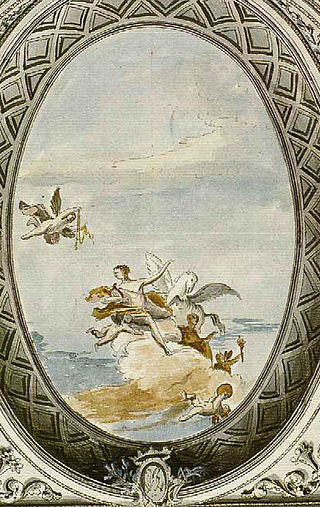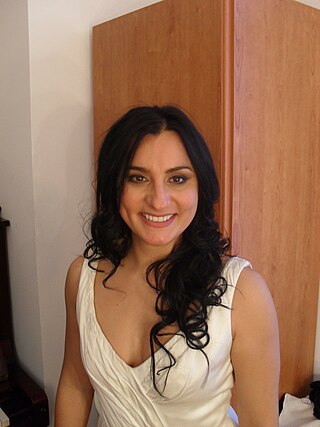
The Barber of Seville, or The Useless Precaution is an opera buffa in two acts composed by Gioachino Rossini with an Italian libretto by Cesare Sterbini. The libretto was based on Pierre Beaumarchais's French comedy The Barber of Seville (1775). The première of Rossini's opera took place on 20 February 1816 at the Teatro Argentina, Rome, with designs by Angelo Toselli.

L'italiana in Algeri is an operatic dramma giocoso in two acts by Gioachino Rossini to an Italian libretto by Angelo Anelli, based on his earlier text set by Luigi Mosca. It premiered at the Teatro San Benedetto in Venice on 22 May 1813. The music is characteristic of Rossini's style, remarkable for its fusion of sustained, manic energy with elegant, pristine melodies.

Semiramide is an opera in two acts by Gioachino Rossini. The libretto by Gaetano Rossi is based on Voltaire's tragedy Semiramis, which in turn was based on the legend of Semiramis of Assyria. The opera was first performed at La Fenice in Venice on 3 February 1823.

Tancredi is a melodramma eroico in two acts by composer Gioachino Rossini and librettist Gaetano Rossi, based on Voltaire's play Tancrède (1760). The opera made its first appearance at the Teatro La Fenice in Venice on 6 February 1813, and because Il signor Bruschino premiered in late January, the composer must have completed Tancredi in less than a month. The overture, borrowed from La pietra del paragone, is a popular example of Rossini's characteristic style and is regularly performed in concert and recorded.

La scala di seta is an operatic farsa comica in one act by Gioachino Rossini to a libretto by Giuseppe Maria Foppa. It was first performed in Venice, Italy, at the Teatro San Moisè on 9 May 1812. The overture has been frequently recorded and continues to be featured in the modern concert repertoire.

Il signor Bruschino, ossia Il figlio per azzardo(Signor Bruschino, or The Accidental Son) is a one act operatic farce by Gioachino Rossini to a libretto by Giuseppe Maria Foppa, based upon the 1809 play Le fils par hasard, ou ruse et folie by René de Chazet and Maurice Ourry. The opera was first performed in Venice at the Teatro San Moisè on 27 January 1813.
Farsa is a genre of opera, associated with Venice in the late 18th and early 19th centuries. It is also sometimes called farsetta.

Filippo Galli was an Italian opera singer who began his career as a tenor in 1801 but went on to become one of the most acclaimed basses of the bel canto era, with a voice known for its wide range, extreme agility, and expressivity, and a remarkable gift for acting.

Armida is an opera in three acts by Italian composer Gioachino Rossini to an Italian libretto by Giovanni Schmidt, based on scenes from Gerusalemme liberata by Torquato Tasso.

L’occasione fa il ladro, ossia Il cambio della valigia is an opera in one act by Gioachino Rossini to an Italian libretto by Luigi Prividali, based on Le prétendu par hasard, ou L’occasion fait le larron, an 1810 vaudeville by Eugène Scribe.

Adina is an operatic farsa in one act by Gioachino Rossini with a libretto by Marchese Gherardo Bevilacqua-Aldobrandini. The opera develops the popular theme of the "abduction from the seraglio". The première took place on 22 June 1826 at the Teatro Nacional de São Carlos, Lisbon.

Torvaldo e Dorliska is an operatic dramma semiserio in two acts by Gioachino Rossini to an Italian libretto by Cesare Sterbini, based on the novel/memoir Les Amours du chevalier de Faublas (1787–1790) by the revolutionary Jean-Baptiste Louvet de Couvrai, whose work was the source of the Lodoïska libretto set by Luigi Cherubini (1791), and Lodoiska set by Stephen Storace (1794), and Simon Mayr (1796).

Aureliano in Palmira is an operatic dramma serio in two acts written by Gioachino Rossini to an Italian libretto in which the librettist was credited only by the initials "G. F. R." The libretto has generally been attributed to Felice Romani, but sometimes to the otherwise unknown Gian Francesco Romanelli. It has been suggested that the latter name may have resulted from a confusion of Romani with Luigi Romanelli, La Scala's house poet prior to Romani's appointment to the post.

L'equivoco stravagante is an operatic dramma giocoso in two acts by Gioachino Rossini to an Italian libretto by Gaetano Gasbarri. It was Rossini's first attempt at writing a full two-act opera.

La cambiale di matrimonio is a one-act operatic farsa comica by Gioachino Rossini to a libretto by Gaetano Rossi. The libretto was based on the play by Camillo Federici (1791) and a previous libretto by Giuseppe Checcherini for Carlo Coccia's 1807 opera, Il matrimonio per lettera di cambio. The opera debuted on 3 November 1810 at the Teatro San Moisè in Venice. It had a run of thirteen performances at Teatro San Moisè.

The Teatro San Moisè was a theatre and opera house in Venice, active from 1620 to 1818. It was in a prominent location near the Palazzo Giustinian and the church of San Moisè at the entrance to the Grand Canal.

Carmela Remigio is an Italian operatic soprano.

Chiara e Serafina, o I pirati is an opera semiseria in two acts by Gaetano Donizetti to a libretto by Felice Romani, based on the melodrama La cisterne by René Charles Guilbert de Pixérécourt. Donizetti's first opera for La Scala, it was premiered on October 26, 1822, but was not a success. Donizetti was not given the opportunity to compose again for La Scala until writing Ugo, conte di Parigi nearly a decade later.

Il fortunato inganno is an opera buffa in two acts by Gaetano Donizetti, to a libretto by Andrea Leone Tottola. Composed in 1823, it was first given on September 3 of that year at the Teatro Nuovo in Naples. It was not a success, and has disappeared from the repertory.
Giuseppe Maria Foppa was an Italian librettist. He wrote around 150 libretti, mainly for comic operas, as well as Latin oratorio texts and his memoirs.








